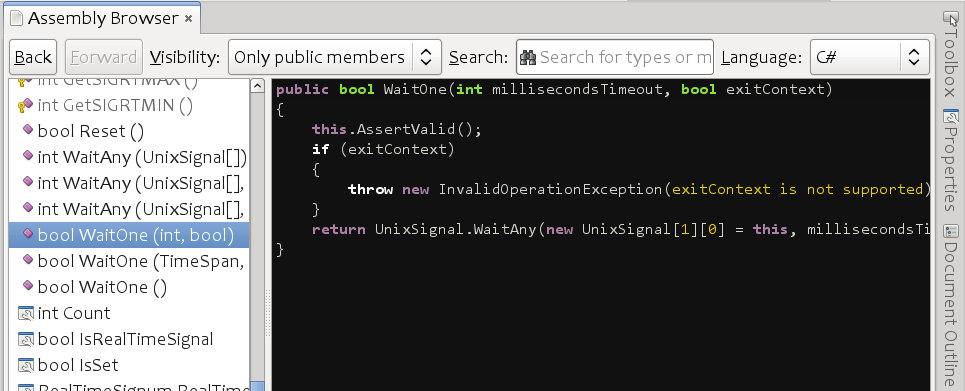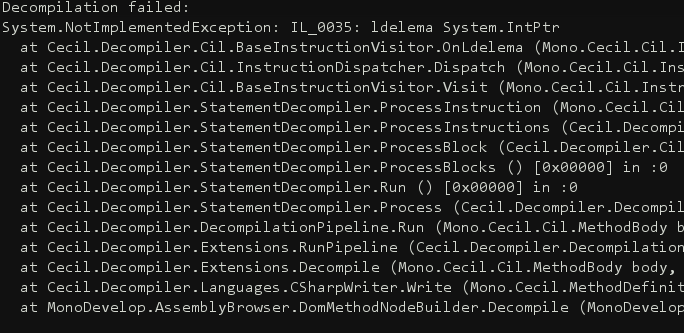On Reflector
Red Gate announced that their Reflector tool would soon become a paid-for app. A few years ago they bought the rights to Reflector from Lutz Roeder and started maintaining two editions of the product: a free version and a commercial version with extra features. Many people in the .NET community feel unhappy about that decision.
Whether Red Gate's decision is good or not for them is up to other blogs to discuss. I am grateful that over the years Reflector ran with Mono's Windows.Forms implementation and that the maintainers were careful to keep the code running with Mono.
Of course, I would always like more an open source equivalent to a proprietary tool, and while Reflector was a free download, it was never open source.
Some believe that in response to the announcement we created a competitor to Reflector. We did not.
We have had a decompiler in Mono for a few years now. First, we had a decompiler contributed to MonoDevelop by Andrea and we later replace it with the one that was developed by JB Evain:

The current decompiler in MonoDevelop actually originated not as a decompiler, but as a flow-analysis tool in 2005. It was part of db4Object's Native Queries. Native Queries were a way of getting some of the benefits of LINQ without any compiler support. It worked by reassembling the AST at runtime from a stream of IL instructions. For example, you could use the following C# code to query a database:
IListpilots = db.Query (delegate(Pilot pilot) { return pilot.Points == 100; });
The Query method would decompile the code in the delegate and reconstruct the abstract syntax tree and determine that the expression to query was pilot.Points == 100.
JB Eventually expanded hi IL Manipulation library Cecil to contain a decompiler built based on the ideas of flow analysis. JB described this back in December of 2008 as part of a Hack Week followed by a hack-a-thon:
During the last Hack-Week, I started refactoring Cecil.FlowAnalysis, and since then, I’ve been working pretty seldom on it. It was last month that I decided to give it a kick, and even took a week of vacations to organize a CodeCamp with friends to give it a boost and have fun altogether
The decompiler is just one of the various tools built with Cecil and has been a standard component of MonoDevelop for a long time (it is part of MonoDevelop 2.4).
Although yesterday in response to the announcement, a WPF UI was created for the Cecil.Decompiler.dll, this is not the only effort. There is also an older Cecil Studio that uses Windows.Forms that was created a few years ago and of course, our own MonoDevelop assembly browser.
We welcome contributions to the decompiler for people interested in improving the core, regardless of their preference for a UI built on top of it:

That being said, JB has been working on a new system that goes beyond decompilation and will be demoed at QCon next month. Stay tuned for his demo.
Posted on 04 Feb 2011
Blog Search
Archive
- 2024
Apr Jun - 2020
Mar Aug Sep - 2018
Jan Feb Apr May Dec - 2016
Jan Feb Jul Sep - 2014
Jan Apr May Jul Aug Sep Oct Nov Dec - 2012
Feb Mar Apr Aug Sep Oct Nov - 2010
Jan Feb Mar Apr May Jun Jul Aug Sep Oct Nov Dec - 2008
Jan Feb Mar Apr May Jun Jul Aug Sep Oct Nov Dec - 2006
Jan Feb Mar Apr May Jun Jul Aug Sep Oct Nov Dec - 2004
Jan Feb Mar Apr May Jun Jul Aug Sep Oct Nov Dec - 2002
Jan Feb Mar Apr May Jun Jul Aug Sep Oct Dec
- 2022
Apr - 2019
Mar Apr - 2017
Jan Nov Dec - 2015
Jan Jul Aug Sep Oct Dec - 2013
Feb Mar Apr Jun Aug Oct - 2011
Jan Feb Mar Apr May Jun Jul Aug Sep Oct Nov Dec - 2009
Jan Feb Mar Apr May Jun Jul Aug Sep Oct Nov Dec - 2007
Jan Feb Mar Apr May Jun Jul Aug Sep Oct Nov Dec - 2005
Jan Feb Mar Apr May Jun Jul Aug Sep Oct Nov Dec - 2003
Jan Feb Mar Apr Jun Jul Aug Sep Oct Nov Dec - 2001
Apr May Jun Jul Aug Sep Oct Nov Dec